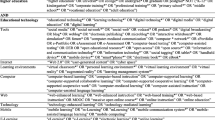Abstract
The purpose of this paper is to gain more insight into the relationship between teachers’ approaches to teaching on the one hand, and the characteristics of context and teacher demographics on the other. Data were collected from 50 teaching staff at the University of Antwerp and from three sources: a Dutch translation of the Approaches to Teaching Inventory (ATI), information given by the participants, and information obtained through the personnel department of the university. Only the conceptual change/student-focused scale of the ATI had good reliability and was used for further analysis. Analysis of variance (ANOVA) showed no relationship between teachers’ approaches to teaching and the context variables of expert level of students, teaching discipline and the number of students in the classroom. Neither was a relationship found between the teachers’ conceptual change/student-focused approach and the teacher characteristics of gender, academic status, teaching experience, age and intention to participate in teacher training. Several interpretations of these data and perspectives for further research are discussed.
Similar content being viewed by others
References
Becher, T. (1989). Academic tribes and territories: Intellectual enquiry and the cultures of disciplines. Buckingham: Open University Press.
Biggs, J. (2003). Teaching for quality learning at university (second edition). Buckingham: Open University Press.
Biglan, A. (1973). Relationships between subject matter characteristics and the structure and output of university departments. Journal of Applied Psychology, 57, 204–213.
Gibbs, G. (1992). Improving the quality of student learning. Bristol: Technical and Educational Services Ltd.
Gibbs, G., & Coffey, M. (2004). The impact of training of university teachers on their teaching skills, their approach to teaching and the approach to learning of their students. Active Learning in Higher Education, 5, 87–100.
Green, S. B., & Salkind, N. J. (2003). Using SPSS for windows and macintosh. Analyzing and understanding data (third edition). New Jersey: Pearson Education.
Kember, D., & Gow, L. (1994). Orientations to teaching and their effect on the quality of student learning. Journal of Higher Education, 65, 58–74.
Keselman, H. J., Huberty, C. J., Lix, L. M., Olejnik, S., Cribbie, R., Donahue, B., Kowalchuk, R. K., Lowman, L. L., Petoskey, M. D., Keselman, J. C., & Levin, J. R. (1998). Statistical practices of educational researchers: An analysis of their ANOVA, MANOVA, and ANCOVA analyses. Review of Educational Research, 68, 350–386.
Lacey, C., & Saleh, A. (1998). Teaching nine to five: A study of the teaching styles of male and female professors. A paper presented at the Women in Educational Leadership Annual Conference, October 11–12, 1998.
Lindblom-Ylänne, S., Trigwell, K., Nevgi, A., & Ashwin, P. (2006). How approaches to teaching are affected by discipline and teaching context. Studies in Higher Education, 31, 285–298.
Lueddeke, G. R. (2003). Professionalizing teaching practice in higher education: A study of disciplinary variation and ‘teaching scholarship’. Studies in Higher Education, 28, 213–228.
Martin, E., Trigwell, K., Prosser, M., & Ramsden, P. (2003). Variation in the experience of leadership of teaching in higher education. Studies in Higher Education, 28, 247–259.
Marton, F., & Säljö, R. (1976). On qualitative differences in learning – I: Outcome and process. British Journal of Educational Psychology, 46, 4–11.
Nevgi, A., Postareff, L., & Lindblom-Ylänne, S. (2004). The effect of discipline on motivational and self-efficacy beliefs and on approaches to teaching of Finnish and English university teachers. A paper presented at the EARLI SIG Higher Education Conference, June 18–21, 2004.
Nichols, J., & Miller, R. (1994). Cooperative learning and student motivation. Contemporary Educational Psychology, 19, 167–178.
Postareff, L., Lindblom-Ylänne, S., & Nevgi, A. (in press). The effect of pedagogical training on teaching in higher education. Teaching and Teacher Education.
Prosser, M., & Millar, R. (1989). The ‘how’ and ‘what’ of learning physics. European Journal of Psychology of Education, 4, 513–528.
Prosser, M., Ramsden, P., Trigwell, K., & Martin, E. (2003). Dissonance in experience of teaching and its relation to the quality of student learning. Studies in Higher Education, 28, 37–48.
Prosser, M., & Trigwell, K. (1999). Understanding learning and teaching. The experience in higher education. Buckingham: Open University Press.
Prosser, M., & Trigwell, K. (1997). Relations between perceptions of the teaching environment and approaches to teaching. British Journal of Educational Psychology, 67, 25–35.
Ramsden, P. (1992). Learning to teaching in higher education. London: Routledge.
Singer, E. (1996). Espoused teaching paradigms of college faculty. Research in Higher Education, 37, 659–679.
Trigwell, K., & Prosser, M. (1991). Relating approaches to study and the quality of learning outcomes at the course level. British Journal of Educational Psychology, 61, 265–275.
Trigwell, K., & Prosser, M. (1996). Congruence between intention and strategy in science teachers’ approach to teaching. Higher Education, 32, 77–87.
Trigwell, K., & Prosser, M. (2004). Development and use of the approaches to teaching inventory. Educational Psychology Review, 16, 409–425.
Trigwell, K., Prosser, M., Ramsden, P., & Martin, E. (1998). Improving student learning through a focus on the teaching context. In G. Gibbs (Ed.), Improving student learning. Oxford: Oxford Centre for Staff Development.
Trigwell, K., Prosser, M., & Waterhouse, F. (1999). Relations between teachers’ approaches to teaching and students’ approaches to learning. Higher Education, 37, 57–70.
van Rossum, E. J., & Schenk, S. M. (1984). The relationship between learning conception, study strategy and outcome. British Journal of Educational Psychology, 54, 73–83.
Author information
Authors and Affiliations
Corresponding author
Rights and permissions
About this article
Cite this article
Stes, A., Gijbels, D. & Van Petegem, P. Student-focused approaches to teaching in relation to context and teacher characteristics. High Educ 55, 255–267 (2008). https://doi.org/10.1007/s10734-007-9053-9
Received:
Accepted:
Published:
Issue Date:
DOI: https://doi.org/10.1007/s10734-007-9053-9




